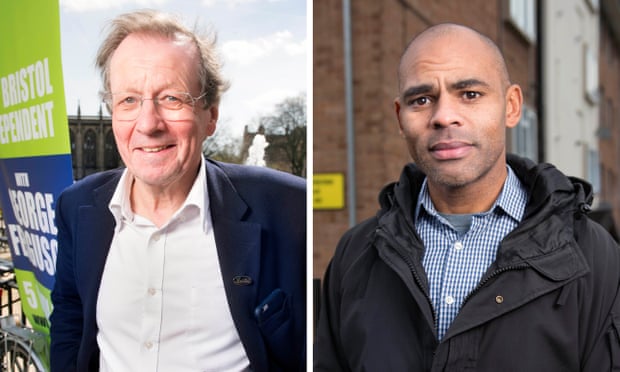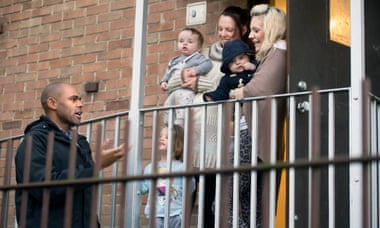Bristol elects Labour's Marvin Rees as new mayor
The Labour candidate took 68,750 votes ahead of his rival George Ferguson's 39,577
link to article: http://www.independent.co.uk/news/uk/politics/bristol-elects-labours-marvin-rees-as-new-mayor-a7018526.html
Labour’s Marvin Rees has been elected as the new Mayor of Bristol, defeating rival George Ferguson of Bristol First at the second count.
Mr Rees, who was defeated by independent candidate Mr Ferguson in 2012, took 68,750 votes ahead of Mr Ferguson's 39,577 at the second count.
The Labour candidate also led the first preference votes with 40.4 per cent (56,729) ahead of Mr Ferguson’s 23.1 per cent (32,375). His victory is coupled with the turnout in Bristol almost doubling to 45 per cent from 2012.
Jeremy Corbyn, who travelled to Bristol on Saturday, has offered his congratulations, describing Mr Rees as "another Labour mayor who will stand up for their city".
Conservative candidate, Charles Lucas, beat the Green Party's Tony Dyer to third place, while Lib Dem candidate, Kay Barnard, came in fourth, followed by Ukip's Paul Turner.
Speaking after his victory, Mr Rees said: "One of the things I can do in the coming months is to show how we can be involved in electoral politics as a family.
"If you don't make politics family-friendly, you end up with a certain type of politician.
"We need family people elected and we need to make space for them. I am going to make space for my family."
Mr Ferguson, who has held the position of Mayor of Bristol since 2012, thanked his victor for "giving me my life back".
"It has been an amazing three-and-a-half years. I knew we were up against it first time but I knew we were even more up against it second time, especially as I am a great advocate for us having all-out elections."
Bristol was an important target for Labour, with Mr Rees leading a lively campaign in the area.
Mr Rees previously told the Guardian, that a win for him in Bristol, and for Sadiq Khan in London, would indicate real political change: “I think the Bristol election is important to national Labour.
“In myself and Sadiq you see evidence of the fact that Labour offers real political change. Look at our backgrounds. Sadiq is the son of a bus driver, I’m the mixed race son of a single white woman who spent time in a refuge.”
Mr Corbyn has backed Mr Rees throughout his mayoral campaign, making several visits to the city.
Speaking to the Bristol Post last month, Mr Corbyn said: "[The election] is an opportunity for the people of Bristol to elect a mayor who is going to deliver for this city and the council for this city.
"It's a test for the party to get its message across - the message of opposition to austerity, the message of dealing with the housing crisis which is gripping this country - and we are doing our best to do that."
Mayoral wins in London, Bristol, Salford and Liverpool have been a major boost for Labour, which had suffered the humiliation of slipping to third place in Scotland, once a stronghold for the party.
In Wales, Labour lost control of the Welsh Assembly after the totemic seat of Rhondda fell to the Plaid Cymru leader Leanne Wood.
But in English council elections, the party faired less badly than many pundits had expected – losing only 25 seats of the 1,200 it was defending.
The party also retained control of key councils such as Crawley, Southampton, Norwich and Hastings, where its vote had looked vulnerable.
Mr Rees will take office on Monday when he will be officially sworn in at a ceremony at Bristol Museum, M-shed.
--
Portrait:
from The Guardian, in February
Marvin Rees: the Bristolian bearing the weight of Labour hopes
Rees wants to become mayor to help the city’s poor, but he also knows how much a win would boost Corbyn’s leadership
Marvin Rees, Labour’s candidate for the Bristol mayoralty, is chatting to two mothers on the Long Cross estate. They are complaining about the syringes dropped on the waste-ground near their flats, the rubbish spilling from bins, the traffic congestion. “It’s not too great around here. We don’t feel part of the Bristol you see on the telly,” says Shannon Ogborne, 20. “There are a lot of people doing well in this city but we don’t see that out here.”
A good chunk of Bristol is booming. Young, talented, moneyed people are moving in, attracted by good jobs and a buzzing city centre. This weekend BBC 6 Music is hosting an eagerly awaited festival that will focus on the vibrant music and arts scene in Banksy’s home patch.
Bristol’s directly elected mayor – the independent George Ferguson – has undoubtedly done huge amounts to raise the profile of the city, not only launching eye-catching schemes and developments but travelling abroad for an audience with the pope and rubbing shoulders with the world’s political leaders, including the UN secretary general, Ban Ki-Moon, at the UN climate talks in Paris in December.
But he will face a battle over the next few months to retain power. Labour was devastated when Rees, the favourite for the mayoralty in 2012, was pipped by Ferguson, and will fight even harder for the 43-year-old in 2016. A key argument will be that, while many parts of Bristol are doing well, there are pockets of deprivation where things may be getting worse.
There is an intriguing side issue, too, of course. The mayoral race in Bristol – where Labour has three MPs and the biggest group on the city council – will be a key test of whether Jeremy Corbyn may have a long-term future as party leader.
It is not surprising, then, that Rees, who has given up his job as a public health manager to run for mayor, is already out and about, keen to investigate Ferguson’s record.
“George is a decent fella,” Rees said. “He has done a lot to raise the profile of the city. He’s a fantastic presenter, a storyteller. He’s gone around the world representing Bristol. We need to assess to what extent that has played back into real benefit for the city. Has it played back into the lives of real Bristolians? Has it led to quality jobs, access to childcare, economic inclusion?”
Bristol has just completed its year as European Green Capital, but Rees said he was struck by one particular publicity image: “It was of a piece of land ripped from the Earth and floating away.” Clinging to the land were some classic Bristol landmarks – including the Clifton suspension bridge.
“That encapsulates the problem,” Rees said. “You have this beautiful story that is ascending into the heavens. You imagine the rest of the people looking up wishing they were part of that story. We should find it morally challenging that in many ways there’s a story of Bristol that is racing off over the horizon and leaving people behind.”
A report presented to City Hall seems to back up some of Rees’s concerns. The More Than A Roof strategy concluded that Bristol was a “city of inequalities with persistent health and wellbeing gaps between different parts”.
It said housing was becoming increasingly unaffordable for many people and that the number of rough sleepers continued to rise. It also suggested too many local people were struggling to get the good jobs from which smart outsiders were benefitting.
“Despite the prosperity within the city, there are substantial problems of deprivation in parts of Bristol,” the report said. “The neighbourhoods that do not share the city’s prosperity often have insufficient good housing, transport and access to employment opportunities.”
An academic study by Robin Hambleton, from the University of the West of England, and David Sweeting, of the University of Bristol, was also striking.
It found a “significant increase” in the visibility of city leadership. In 2012, 24% of citizens thought the city had visible leadership, and by 2014, this figure had risen to 69%. But the report made clear that people from the poorer areas of Bristol felt much less represented than those from the wealthier areas: “These differences between different socio-economic groups suggest that more effort is needed to advance the cause of social inclusion in the democratic governance of the city.”
Rees says the key job of the mayor is to ensure Bristol is a great place for everyone, rich and poor. “If it doesn’t work, you end up with a fragile society and loose social ties that leave you vulnerable to the type of social disintegration we saw ending in the 2011 summer riots.
“Inequality is also an economic liability; inequality costs. We have to spend public money dealing with the consequences of inequality whether it be poor health, poor educational attainment … It means we don’t get the workforce we need, we end up importing workers because kids born in the city don’t have access to the high-quality education needed.”
Rees’s campaign is likely to take a different tack to 2012, when he was keen simply to talk about what he believed in rather than criticise his opponents. This time he is expected to take on Ferguson head-to-head, and talk more about his own story.
Rees is of mixed race and the son of a retired nursery nurse, Janet, who will introduce him when he launches his campaign this weekend at his old primary school. He lived for a while on the Long Cross estate, a largely white, working class area, where he faced racist abuse. He did well at school, went on to university, worked in the media as well as the health sector, and came to the Labour party and politics through Operation Black Vote.
It clearly irks Rees that during the last campaign Ferguson was the focus of the media, who appeared taken by his promise of politics that was independent of any party. He said he believed reporters swallowed a line that, because Ferguson looked different (he is known for his red trousers) and did not speak like a regular politician, he was anti-establishment.
“It’s all right saying you’re going to be independent [but] you have to deliver on that, you have to take Westminster on.” He said the London mayor and Conservative politician, Boris Johnson, had stood up to the government more than Ferguson.
(...)
Rees voted for Andy Burnham as leader, but said he liked Corbyn. “I love the fact he is raising questions that need to be raised about the very nature of the way we do politics and economics. I think he’s a symptom of people’s search for authenticity in politics. I like him – and he made my mum comfortable when he met her; that means a lot to me.”


No comments:
Post a Comment